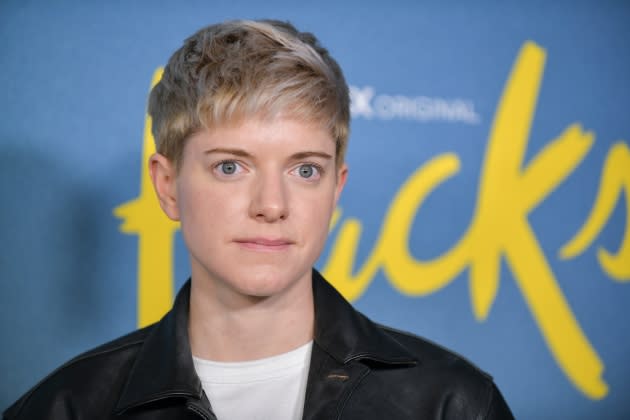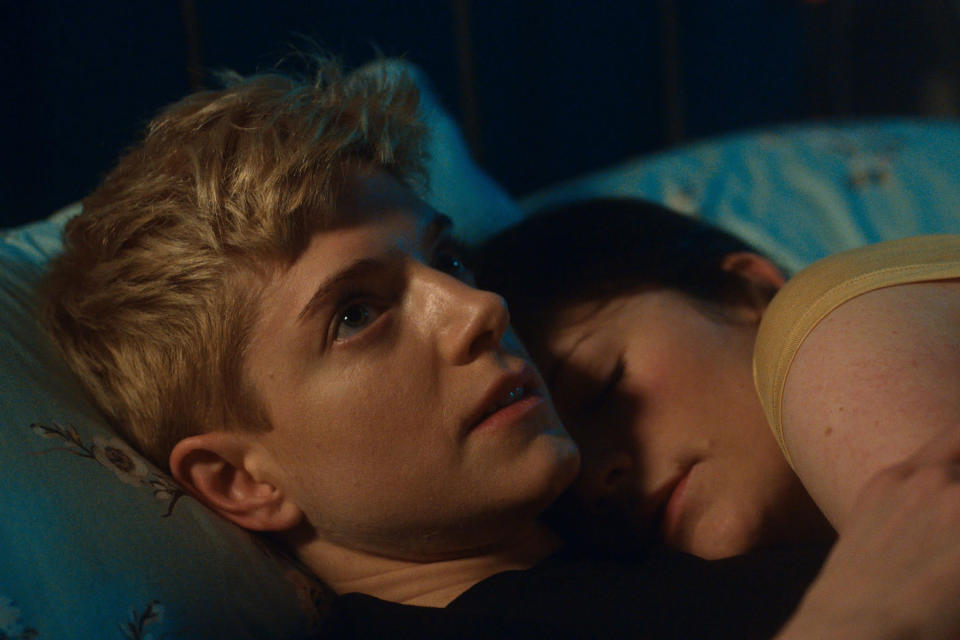Why Mae Martin Called Out Dave Chappelle in Their Netflix Special

Mae Martin wants people to know that they identify, mainly, as a comedian.
The nonbinary Canadian-turned-British-turned-LA transplant has been doing stand-up comedy for years. But right now, they’re best known for the semi-autobiographical dramedy Feel Good. The series, which had two critically acclaimed seasons on Netflix, stars Martin as a messy and not very good Canadian comedian who moves to the U.K. Their move, feelings about gender, and long-term recovery from addiction are all complicated when they fall in love.
More from Rolling Stone
Inside TV Writers' Fight to Keep Their Shows From Disappearing
Penn Badgely Will Escape Joe Goldberg's Cage as Netflix Renews 'You' For Final Season
Martin, who uses they/them pronouns, was praised for how they turned their real-life story into a television narrative. But they tell Rolling Stone that while approaching their own life in a brutally honest way was cathartic, they’re ecstatic to be returning to their true love: stand-up comedy. Martin’s first hour-long special, Sap, premieres March 28 on Netflix. But for people looking for a third season of Feel Good, you’re in the wrong place.
“After Feel Good I really wanted a break from anything too personal,” they tell Rolling Stone. “For about a year, I was doing a lot of improv and stand-up and that felt really good. It reminded me of what I loved about comedy when I was a teenager and that kind of silliness. When you’re improvising, you can’t really be cerebral in any way. You have to fall back on your inner clown. And that is really refreshing.”
With topics ranging from a loving (and odd) nickname during teen rehab, to the relative height of the largest moose in the world, Sap leaves Martin’s public wounds behind for lighter waters. But the comedian does take time to wrap up their sunny moments with a refreshingly honest look at how comedy is treating the trans community — a combination of gut-busting laughs and uncomfortable truths that work together to deliver a solid special.
Rolling Stone spoke with Martin about their debut comedy special, comedy’s focus on the trans community, and what sweet joys make life worth it at this very moment.
How are you feeling about the premiere? And for people who have only seen your work in Feel Good, what will surprise them about Sap?
This feels way less stressful because it’s a show that I toured and I know it’s at least mediocre. Feel Good felt like a totally new medium. It was so personal and I’d never acted before, and I was nervous about my parents watching it. But slowly out of my improv material, a show started to take shape. Coming out of the pandemic I was feeling pretty confused. I think that there’s less of a kind of narrative arc in this show. It’s more of a thematic connection and tonal thing that builds hopefully to a satisfying conclusion. But it was about trying to find positivity in an overwhelmingly negative news moment. If people came expecting this kind of deeply confessional trauma comedy, I wanted them to be pleasantly surprised that it’s a lot more than that. I just wanted it to feel uplifting and positive.
This is your first full-length special on Netflix. Abbi Jacobson [Broad City, A League of Their Own] directed the special. What was it like working with her? How was the process from workshopping to filming?
We got paired up by Lisa Kudrow, who is a good friend matchmaker. [She] knew Abbi for a long time and thought that we’d really get along. I was already a fan of her brain and sensibility and I just instantly felt like I’d known her for years. She’s not afraid to have feelings and I’m, like, pathologically earnest, so it was a good match.
I’ve always felt that comedy can often be a good indicator of where culture is at the moment. How do you think the medium has changed since you began stand-up?
A comedy audience has always been an interesting little microcosm of society. When I started, I’d be going up after people who were making homophobic or racist jokes and the audience loved them. And then I’d have to go up and I’d start off apologizing for who I am. But over the years, there’s been a real shift. Like, in most major cities, if you’re going up and doing homophobic material, the audience is not going to get on board. So in that sense it’s super positive. But in the past couple of years, there’s been people mistakenly equating equality with some kind of infringement on their right to free speech. I want to say to these heroes of mine, comedians who are starting to feel like the enemy has become this kind of woke left: you’re being tricked.
How do you balance that self-described earnestness in a comedy climate that seems to be unfairly focused on the queer and trans community. I mean, even in the special, you name-drop comedians like Dave Chappelle, who has been consistently criticized for transphobic jokes.
When you’re someone who’s part of the trans community, it can feel like a lose-lose. Because as soon as I start talking about it, people are like, “Ugh, these people are constantly whining.” But it’s also a very crucial time to present a counterargument to the very loud people with huge platforms who are weighing in in bad faith about things that have real-life consequences. It’s a very difficult tone to hit because I do care about it so deeply, and could so easily rant for hours about how annoyed I am. So if it’s in any way helpful for people to see someone speaking about their lived experience and cutting through the endless debate about whether trans people deserve to be happy, then hopefully it’s worth it. But also, it’s not the most interesting thing about me and I don’t want to feel like it because I’m being forced to constantly defend my identity.

Were you ever nervous that taking up time during your special to name the comedians would paint a target on your back?
When I was touring the show I tried it — not naming them. It just felt like I was trying to be coy. I feel confident about what I’m saying, so I might as well just name them. The main thing I wish is that straight allies with bigger platforms would be brave enough to weigh in as well. Because it’s easy to dismiss queer people as being constantly up in arms about something. But with the legislation, we’re seeing such terrifying real-life consequences. And they’re things that affect everybody — there’s such a parallel between trans rights and bodily autonomy for women and all kinds of things that I think it’s time we all got involved a little bit.
What do you hope people take away from the special?
Everything will sound corny in print, but truly: comedy is meant to make people feel less alone. The best thing is when people leave your show and you hear them talking in the bathroom after and they’re feeling inspired to talk about their sap. Such an amazing byproduct of making something is that you could be part of someone’s inner world. That’s so meaningful to me. Even on my days off, I’m going to see comedy because I love the feeling of being in a group of people that’s all laughing at the same thing. It’s such a unifying experience. It makes you feel human and less isolated. So I hope people feel that.
Best of Rolling Stone


